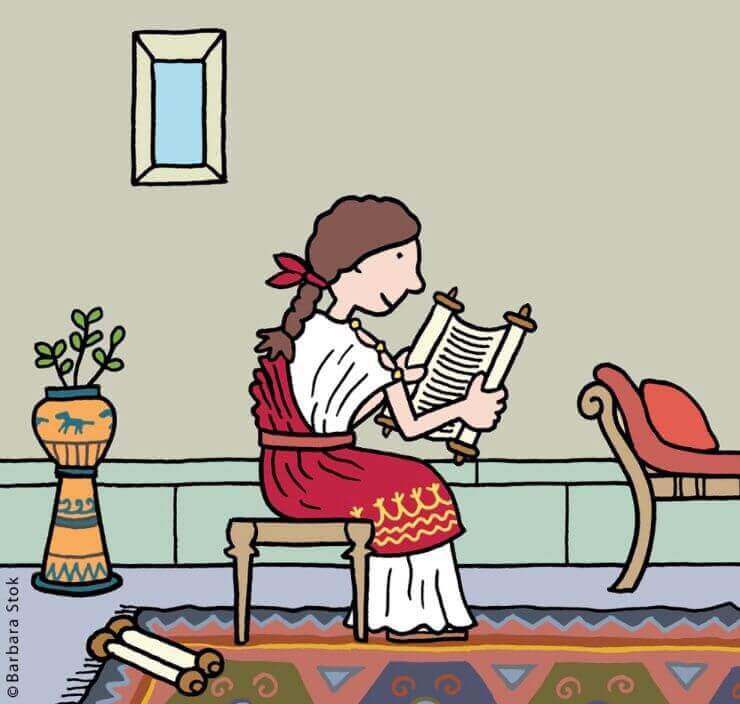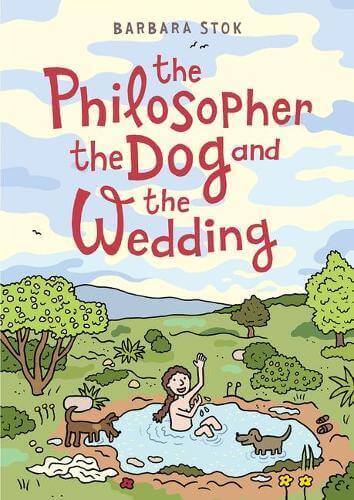Looking for Wisdom Interview: Comics artist and writer Barbara Stok talks about dogs, Cynics, philosophers, and the art of living.
Here at Looking for Wisdom, we’ve long been fascinated by the Cynic philosopher Hipparchia. So we were wildly excited when we stumbled across Dutch comic artist Barbara Stok’s sublime The Philosopher, the Dog and the Wedding.
The book is a beautiful and meticulously researched graphic novel that reimagines Hipparchia’s life, and explores what we might learn from it. First published in Dutch, The Philosopher, the Dog and the Wedding is now available in English translation from Self Made Hero. It is a delight from the first page to the last. And it touches on deep philosophical questions with enormous charm and a lightness of touch.
A couple of weeks back, we caught up with Barbara to talk about philosophy, dogs, gender, comics, cynicism both contemporary and modern, and what we might learn from ancient philosophy
 Barbara Stok (Image © Barbara Stok)
Barbara Stok (Image © Barbara Stok)
Q1: Hello, Barbara! Great to meet you. First off, we’d love to know what first attracted you to Hipparchia.*
Hi Will, great to meet a fellow Cynics enthusiast. I’ve been interested in philosophy for over 20 years, I took up classes at university. And Stoicism has become an important part of my life. When I was in my 30s my husband Ricky and I wanted to have children, but that didn’t work out. The Stoics helped me get over the grief. Since then, I still do Stoic exercises regularly to get peace of mind about daily irritations and such.
So after I finished my graphic novel Vincent, about Vincent van Gogh, it was logical to me to choose a philosopher as my next subject. In a book about women philosophers I found Hipparchia. I had never heard of her, but her story immediately appealed to me. I knew right away I wanted to make a story about her.
That the Cynics were the predecessors of the Stoics I only discovered when I was already working on this book. I had applied for funding and got to work, for starters by reading about it. Only then did I discover that the Cynic Crates was the teacher of Zeno, the founder of the Stoics. Makes sense in retrospect because the ideas are very related, which was precisely why I was attracted to the Cynics.
The Greek for “Cynics” —* Κυνικοί *— means “those who are like dogs.” The term was originally an insult directed at the founder of the school, Diogenes of Sinope. But Diogenes and his followers made it their own. After all, they argued, dogs are better at understanding the art of living than their human companions. You are a dog person yourself, and throughout your book there are countless dogs, going about their doggy lives. So, as a modern-day fan of Hipparchia and the Cynics, what do you think we can learn from dogs about the arts of living?
We had a dog, called Wisky. I learned a lot from her about taking it easy, being in the here and now, and accepting the situation as it is.
Wisky died when I was about halfway working on the book. Her death affected me tremendously, much more than I expected. She had lived with us for twelve years, she was a family member, a friend. For two whole months I was unable to work. This made me think about the millions of animals killed every month here in The Netherlands in the meat industry. Those animals are all individuals, just like our dog. Pigs are even more intelligent than dogs and very social. But no one mourns their deaths like we mourned Wisky. This realisation was the last straw for me to become a vegetarian.
The Cynics radically questioned the cultural norms of their day: ideas about right and wrong, and about how we ought to live. They aimed to return to a more natural way of living, free of the complications of the culture into which they were born. Is this challenge to live more naturally one that can still speak to us today?
Absolutely! I think we too need to radically question our cultural norms and conventions. I think our society is all wrong. Many people in Europe live a comfortable life of luxury, but it’s at the expense of others. Slavery still exists today, animals are used as if they are objects, and we are the cause of the climate crisis, of course. I admire the Cynics because they rigorously renounced the whole system: property, social ranks, national borders. The Cynics say: these are all illusions. They advocated a simpler lifestyle and a principle of equality of everyone. I hope Hipparchia and Crates will be a source of inspiration for people to make different choices.
 Hipparchia © Barbara Stok
Hipparchia © Barbara Stok
As a woman philosopher, Hipparchia offers a particularly powerful critique of the gendered norms of her own time. In what ways are her insights into gender still relevant today? Do we still need modern-day Hipparchias to shake us up and force us to question our assumptions around gender?
I received a response from a reader, a woman who was a refugee from the Middle East. She was very touched by the book because women in her home country nowadays still live exactly as Hipparchia did. But here in Europe also, there are still so many persistent ideas about how women should be and how men should be. Women are caring, men are tough, you name it all. Get rid of it! I have never identified with the stereotypical image of women, and it bothers me.
I would like everyone to have the freedom to do and behave and dress exactly the way they want. If you are in a privileged position you can stand up against the norms to some extent, but a lot of people don’t have that freedom. If you are a woman struggling to get by, and you go to a job interview of a job that you really need, it is almost mandatory to wear makeup, for example. For many people, it’s very hard not to conform to the social rules.

At any time in writing the book, were you yourself tempted to leave home, and become a modern-day Cynic philosopher? If not, in what other ways has spending five years thinking about and researching Hipparchia and the Cynics transformed your own life?
During the making of the book I thought about that, to try living on the streets, even if only for a few days. To better understand what that was like for Hipparchia and Crates. But I didn’t do it. Apparently, that’s a huge step. The Cynics did not think that everyone should live exactly like them though. For the Cynics it was more about the change in attitude.
They certainly changed my attitude. When I have a decision to make, I often think: what would Hipparchia and Crates have done? I live in a small house, I got rid of the car, I buy as little stuff as possible, almost no new clothes any more.
Sometimes I do find this to be a struggle because in this world we are bombarded with the capitalist values of buy this, buy that. It’s easy to get sucked into that. But if you go along with it, it’s a bottomless pit, it never ends. Even if you have a big house and everything, you will still think: it would be nice if we had a swimming pool indoors. There’s always more you can want.
The final two spreads of your book offer a challenge to your reader to think about how we live now. Suddenly, we are no longer on the hillsides of Ancient Greece. Instead, we find ourselves landed back here in the present, in the thick of things: laptops, delivery drivers, police officers, Armani suits, parasols, sports cars with belching exhausts, clocks, perfumes, briefcases, air conditioning…
And yet, if we look closely the dogs are still there, doing their thing, just as they always have done. So is it harder in the present to become a Cynic than it was in Ancient Greece? Or, following the example of the dogs, is it just as easy as it ever was, if only we have the will or the desire?
Well, on the one hand I think it was more difficult for Hipparchia because in Ancient Greece women were legally considered inferior and treated as minors. At the time, what she did was downright shocking and really dangerous. So Hipparchia must have been extremely brave. Life was harsher. Famine, exile, hanging - these were real dangers.
On the other hand, it was easier for them to find food in nature because there was more wild nature altogether that nobody owned. Nowadays, it is difficult to break away from the system we are in. We need money even for the bare minimal necessities of life. We even have to pay for water.
One of the things that we found most enchanting about your book was the attention to detail. There is so much warmth, and so much meticulous care in your depictions of daily life in Ancient Greece. Can you say a bit more about your research process when writing this book?
While working on this graphic novel, many times I thought: what have I gotten myself into? I went through so much documentation. Ricky and I travelled to Greece to get an idea of the vegetation, the landscape, the colours. When I finally started drawing, with every picture I came up against questions: what did that look like? What did the houses look like? What kind of transportation did they have? What approaches to timekeeping did they have? What kind of life did the women have? I had to find out every detail about daily life in antiquity. Gradually, I created their world completely in my head — and Hipparchia and Crates came to life.
Finally, we’d love to know if you have any more philosophical projects in the works? Can we look forward to a growing library of Barbara Stok comics introducing us to history’s overlooked women philosophers?
Yes, I am planning to make another book about a philosopher. Not necessarily a female philosopher, but I’d rather not reveal more yet because it’s still an early stage. Anyway, there is always a philosophical layer in my stories, also in the graphic novel about Vincent van Gogh and in my autobiographical comics.
Thank you, Barbara! We can’t wait to see what you publish next.

About Barbara Stok
Barbara Stok is an award-winning graphic novelist from The Netherlands. Her book Vincent is published in more than twenty countries around the world. Within a month of publication, The Philosopher, the Dog and the Wedding became a bestseller and was nominated for the Hypatia Price. Barbara has fourteen books to her name.
Barbara worked as a journalist before choosing the profession of graphic novelist. She has also been a drummer in a punk rock band. In her first stories she depicted her own everyday experiences: going to punk rock concerts, the fear of death, the art of doing nothing. Her work constantly poses questions about how to live.
She lives in a small house in the North of the Netherlands.
The Philosopher, the Dog and the Wedding is available from all good bookshops! You can buy it in the UK via hive.co.uk, or Bookshop.uk.
Read more about Hipparchia
Read more about Hipparchia in this Philosopher File, and in this blog post about women in the ancient world, weaving, and the arts of argument.



